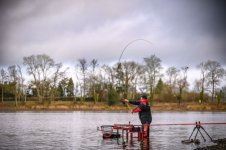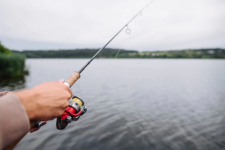sunafresco
Member
- Joined
- Feb 10, 2025
- Messages
- 13
- Reaction score
- 8
This message has been reported.
Fish are highly sensitive to sound, especially in calm waters where even the faintest noises can carry over long distances. Practicing "silent fishing" lets you make the most of your stealth to get close to the fish without alerting them.
Silent fishing is especially valuable in shallow waters, during slower parts of the day (like midday), or when targeting cautious species like bass or trout. In these situations, silence can be a game-changer for your success.
Quiet Rod and Reel Combos: Choose rods and reels that operate smoothly and quietly. Some reels have internal mechanisms that are quite loud, so prioritize high-quality reels with silent operation, smooth drags, and gears that don’t rattle.
Soft Baits and Hard Baits: Soft plastics enter the water with less splash than poppers, crankbaits, and other hard baits. Use soft baits when you need to go ultra-quiet--this is particularly helpful in shallow, clear waters.
Silent Anchors: If you’re fishing from a boat, avoid dropping heavy anchors, which can make disruptive noises. Instead, try “silent anchors”like drift socks that hold your position without sound.
Rubber-Soled Shoes: The truth is it or not, even the sound of foot shuffles could be heard throughout the boat and even into the water. Use rubber-soled shoes to get greater traction and less noise.

Be Patient and Slow: When you're wading or drifting through the water, stay clear of abrupt or rapid motions. Keep an even, steady speed to avoid sound and splashes.
Keep Your Distance: Fish can spot shadows, particularly in shallow waters, so make sure to remain low when you approach the fishing area in order to prevent casting shadows. Fish remain at bay and secluded from your presence.
Limit the Sound From Entry: When you're swimming in, take your steps gently to let water "envelope" your movements, making sure to avoid splashes and loud footfalls that can travel straight into the column of water.
The Soft, Low Cast: Instead of dragging your lure up and over to create an awful amount of noise at impact, go for a soft sidearm casting or a roll cast to put your lure in the water gently.
Feather Line: When casting the line, use your fingers or thumb to "feather" the line--lightly slowing it before it reaches the water. This helps reduce the impact and makes a more natural sound when you enter the water.
Test Your Accuracy Over Distance: Casts made over long distances can take up more space; however, they also generate more noise. Make sure you cast accurately to the target instead of the maximum distance you can. This will allow for a more relaxed entry and help you stay in charge of where the lure goes and where it lands.

Reduce the Impact of Your Footsteps on the Boat: Moving too often creates vibrations. It is best to keep your feet planted and try to avoid shifting your weight regularly.
Fish in Environments With High Levels of Sound: Fishing close to the moving water of rivers or streams creates an effect of natural masking, which allows you to approach fish quietly.
Please Make the Most of Wind and Waves: Fishermen are active on windy days since the noise of the surface makes it more difficult for them to hear other subtle sounds, such as your lure. Wind can help cover small mistakes in the control of sound.
The next time you're out on the water, take your time, breathe deeply, stay relaxed, and take in the peace. By making a few adjustments to your method of travel and equipment, you'll see that a quiet approach can result in many of the most enjoyable fish you'll ever catch.
Silent fishing is especially valuable in shallow waters, during slower parts of the day (like midday), or when targeting cautious species like bass or trout. In these situations, silence can be a game-changer for your success.
Choosing the Right Silent Fishing Gear
The equipment you carry into the water can be the difference between a successful and a silent approach.Quiet Rod and Reel Combos: Choose rods and reels that operate smoothly and quietly. Some reels have internal mechanisms that are quite loud, so prioritize high-quality reels with silent operation, smooth drags, and gears that don’t rattle.
Soft Baits and Hard Baits: Soft plastics enter the water with less splash than poppers, crankbaits, and other hard baits. Use soft baits when you need to go ultra-quiet--this is particularly helpful in shallow, clear waters.
Silent Anchors: If you’re fishing from a boat, avoid dropping heavy anchors, which can make disruptive noises. Instead, try “silent anchors”like drift socks that hold your position without sound.
Rubber-Soled Shoes: The truth is it or not, even the sound of foot shuffles could be heard throughout the boat and even into the water. Use rubber-soled shoes to get greater traction and less noise.

The Approach to the Water Using Stealth
Before you even begin casting, the way you approach the water could make a huge difference.Be Patient and Slow: When you're wading or drifting through the water, stay clear of abrupt or rapid motions. Keep an even, steady speed to avoid sound and splashes.
Keep Your Distance: Fish can spot shadows, particularly in shallow waters, so make sure to remain low when you approach the fishing area in order to prevent casting shadows. Fish remain at bay and secluded from your presence.
Limit the Sound From Entry: When you're swimming in, take your steps gently to let water "envelope" your movements, making sure to avoid splashes and loud footfalls that can travel straight into the column of water.
Silent Casting Techniques
The way you place your lines is among the most important factors that determine how loud you'll sound. A silent, well-placed casting line can make an enormous difference in catching a fish and dissuading them.The Soft, Low Cast: Instead of dragging your lure up and over to create an awful amount of noise at impact, go for a soft sidearm casting or a roll cast to put your lure in the water gently.
Feather Line: When casting the line, use your fingers or thumb to "feather" the line--lightly slowing it before it reaches the water. This helps reduce the impact and makes a more natural sound when you enter the water.
Test Your Accuracy Over Distance: Casts made over long distances can take up more space; however, they also generate more noise. Make sure you cast accurately to the target instead of the maximum distance you can. This will allow for a more relaxed entry and help you stay in charge of where the lure goes and where it lands.

Control Your Noise and Movements
Avoid Unnecessary Conversation: It may sound simple, but an optional conversation can be a big problem in water. Keep the conversation going after the fish is caught.Reduce the Impact of Your Footsteps on the Boat: Moving too often creates vibrations. It is best to keep your feet planted and try to avoid shifting your weight regularly.
Using Nature's Own Sounds to Your Advantage
Natural sounds, such as soft waves, gentle breezes or rustling reeds, make an ambient "white noise" that helps cover any small sounds you may create. Windy days can aid in hiding your presence. The animal sounds, like frogs or birds, help create a peaceful and natural setting in which fish thrive.Fish in Environments With High Levels of Sound: Fishing close to the moving water of rivers or streams creates an effect of natural masking, which allows you to approach fish quietly.
Please Make the Most of Wind and Waves: Fishermen are active on windy days since the noise of the surface makes it more difficult for them to hear other subtle sounds, such as your lure. Wind can help cover small mistakes in the control of sound.
Wrapping Up: Embrace the Power of Silent Fishing
Silent fishing isn't an exercise in practice. From the moment you start casting and casting, pay attention to every sound you make, and you'll hone in on how to successfully fish with respect in a natural environment. It's not just about getting more fish but also about being part of the ecosystem while respecting the water and allowing yourself to be completely immersed in enjoyment. This is because silent fishing is more advantageous when compared to sound fishing.The next time you're out on the water, take your time, breathe deeply, stay relaxed, and take in the peace. By making a few adjustments to your method of travel and equipment, you'll see that a quiet approach can result in many of the most enjoyable fish you'll ever catch.
